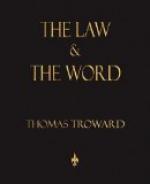“So careful of the type
she seems,
So careless of the single
life.”
This mode of creation reaches its highest level, at any rate in our world, in Genus Homo, or the human race. We also, as a race, are under the Law of Averages. The race continues to exist, but from the moment of birth the individual life is liable to be cut short in a hundred different ways. In producing man, however, Generic Creation has produced a type having a mental and physical constitution capable of perceiving the underlying principle of all creation, that is, of seeing the relation between the Word and the Law. We cannot conceive creation by type going further than this. By the nature of this type every human being has the potential of a further evolution, which will set it free from bondage to an impersonal Law of Averages, by specializing it through the Power of the Word, that is, by bringing the Personal Factor to bear upon the Impersonal Factor, and so unfolding the possibilities which can be achieved by their united activities. We have the power of using the Word so as to specialize the action of the Law, not by altering the Law, which is impossible, but by realizing its principle, and enabling it to work under conditions which are not spontaneously provided by Nature, but are provided by our own selection. The capacity for this exists in all human beings, but the practical application of this capacity depends on our recognition of the principles involved; and it is for this reason that I commenced this book by citing instances of the combined working of Law and Personality in purely physical science. I wanted first to convince the reader from well ascertained facts, that the Law contains infinite possibilities, but that this can only be brought out through the operation of the mind of man.
It is here that we find the value of the maxim “Nature unaided fails.” The more we consider this maxim and the principle of Unity and Continuity, the clearer it will become, that Limitation is no part of the Law itself, but results only from our own limited comprehension of it; and that St. James uses no meaningless phrase, but is stating a logical and scientific truth, when he speaks of “The perfect Law of Liberty” (Jas. i, 25). What we have to do is, to follow this up, not by petulant self-assertion, but by quietly considering the why and wherefore of the whole thing. In doing so we can fortify ourselves with another maxim, that “Principle is not limited by Precedent.” When we spread the wings of thought and speculate as to future possibilities, our conventionally-minded friends may say we are talking bosh; but if you ask them why they say so, they can only reply that the past experience of the whole human race is against you. They do not speak like this in the matter of flying-machines or carriages that go without horses; they say these are scientific discoveries. But when it comes to the possibilities of our own souls,




